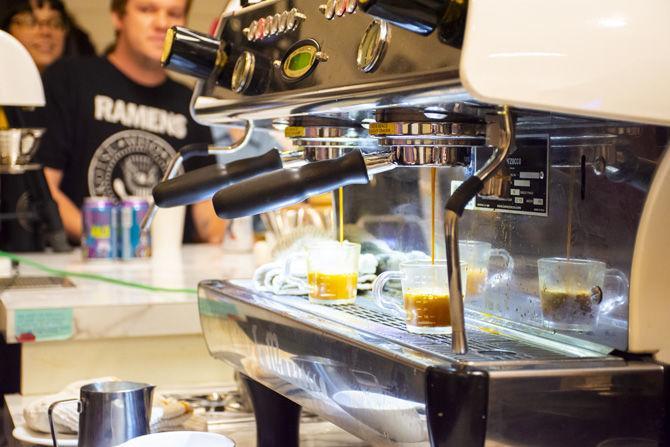Coffee shop lines get longer around exam season, as students depend on caffeinated beverages to help them through long nights of studying. Nutrition and Food Sciences instructor Judy Myhand said the extra caffeine intake may actually add years onto your life.
“Coffee has plenty of health benefits,” Myhand said. “It’s associated with reduced risk of early death, reduced risk of Type 2 diabetes, and Parkinson’s disease.”
Myhand said the misconception of coffee being unhealthy comes from studies conducted earlier in the 20th century, when it was common to smoke a cigarette along with coffee in the morning. Researchers are discovering the cancers and heart problems formerly associated with caffeine intake were more likely due to smoking.
Sociology junior Carlie Schenk is one of many college students who drinks coffee every day. She’s trying to cut back, but because of the additives, not the coffee itself.
“I put a lot of cream and sugar in my coffee,” Schneck said. “I know it’s going to catch up to me eventually.”
She admitted her habit was costly, and she often prioritizes her morning coffee above other expenses.
“No matter how much money I have, I always find a way to get coffee when I need it,” Schenk said. “It for sure has an effect on my bank account.”
The daily recommended caffeine dosage is 400 milligrams, or four cups a day. Anything exceeding 400 milligrams can leave the drinker at risk for anxiety and sleep problems. Myhand said most people, even avid coffee drinkers, shouldn’t struggle to stay below the daily limit. The more realistic concern is the amount of money college students are spending.
According to reports from Acorns’ Money Matters, the average American spends approximately $1,100 a year on coffee. The same study showed millennials in particular are buying more coffee than previous generations.
“It’s mind-blowing to me how much money my students spend on coffee at coffee shops,” Myhand said.
Student Health Center Dietitian Emily Claire said the other detriments of coffee shouldn’t be discounted yet.
“There’s not a lot of understanding behind the research and there’s still a lot more research to be done,” Claire said.
Claire works one-on-one with students to ensure their diet isn’t negatively impacting their lifestyle. She said she encounters many students who are concerned about their caffeine intake.
“I think some students do really well with keeping a moderate level and other students are struggling,” Claire said.
Myhand and Claire both agreed that coffee is safer and more beneficial than energy drinks. Some people prefer Monster or 5-Hour Energy to coffee because of the sweeter flavoring, but energy drinks pose more of a health risk than coffee, despite containing less caffeine.
“Energy drinks are hard to pinpoint because they don’t do a good job of labeling the drinks,” Claire said. “It’s hard to know how much you’re getting.”
Whatever method a student chooses to stay alert during exam week, Myhand said that those who don’t typically consume coffee or energy drinks should exercise extreme caution. People who haven’t established a caffeine tolerance are more prone to anxiety attacks and sleeping problems.
Students should also watch how much money they spend on coffee, and consider whether or not they are buying it out of habit.
“There’s a not exactly addictive, but a habit-forming aspect to coffee,” Myhand said. “You go get your morning coffee instead of doing other things to take care of yourself. Good energy should come from the food you eat.”




